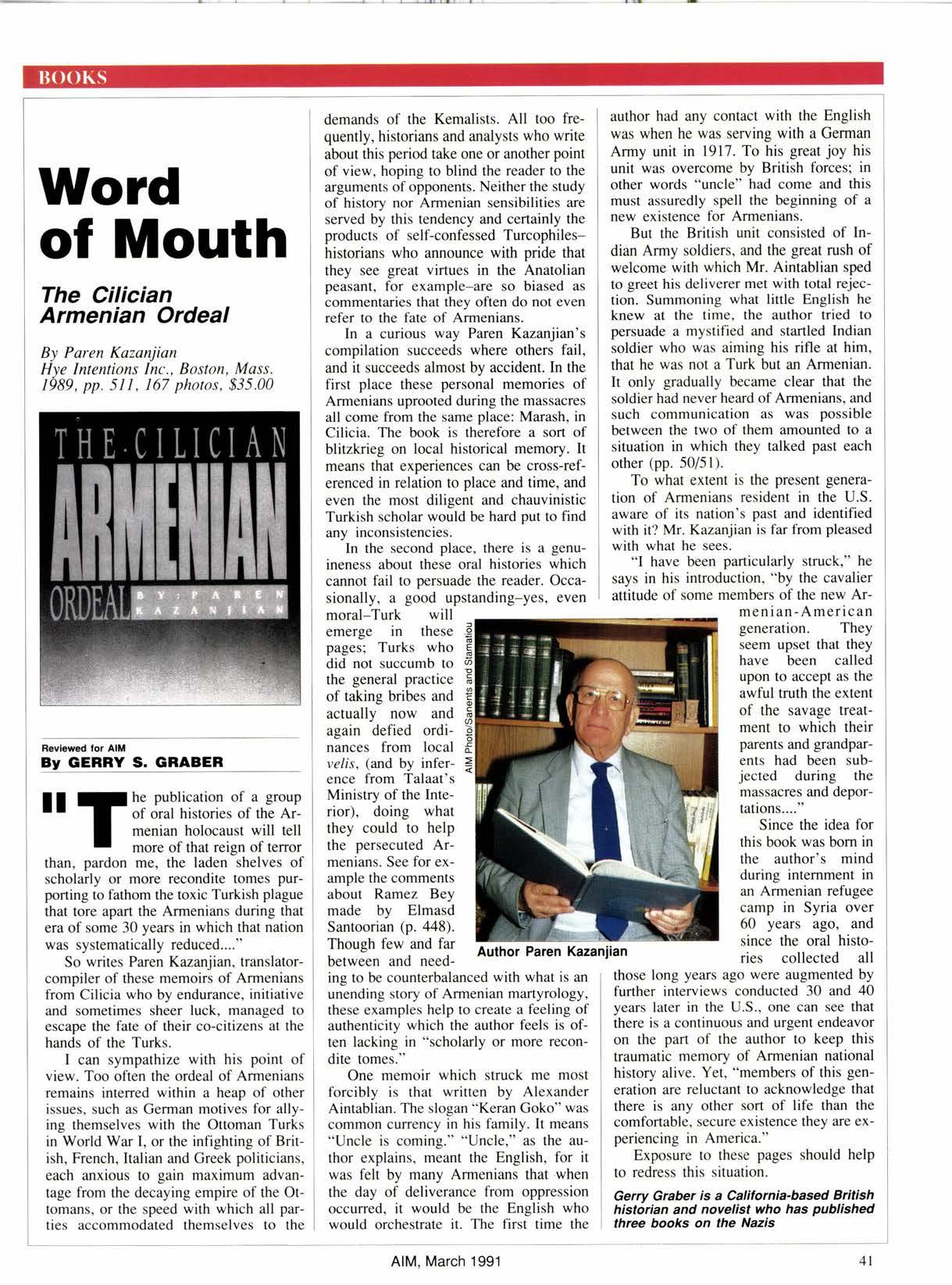
3 minute read
Word of Mouth
The Cilician Armenian Ordeal
By Paren Kazanjian Hye Intentions Inc., Boston, Mass. tg9g, pp. 5ll. 167 photos, $35.00
Advertisement
demands of the Kemalists. All too frequently, historians and analysts who write about this period take one or another point of view, hoping to blind the reader to the arguments of opponents. Neither the study of history nor Armenian sensibilities are served by this tendency and certainly the products of self-confessed Turcophileshistorians who announce with pride that they see great virtues in the Anatolian peasant, for example-are so biased as commentaries that they often do not even refer to the fate of Armenians.
In a curious way Paren Kazanjian's compilation succeeds where others fail, and it succeeds almost by accident. In the first place these personal memories of Armenians uprooted during the massacres all come from the same place: Marash, in Cilicia. The book is therefore a sort of blitzkrieg on local historical memory. It means that experiences can be cross-referenced in relation to place and time, and even the most diligent and chauvinistic Turkish scholar would be hard put to find any inconsistencies.
author had any contact with the English was when he was serving with a German Army unit in 1917. To his great joy his unit was overcome by British forces; in other words "uncle" had come and this must assuredly spell the beginning of a new existence for Armenians.
But the British unit consisted of lndian Army soldiers, and the great rush of welcome with which Mr. Aintablian sped to greet his deliverer met with total rejection. Summoning what little English he knew at the time, the author tried to persuade a mystified and startled Indian soldier who was aiming his rifle at him, that he was not a Turk but an Armenian. It only gradually became clear that the soldier had never heard of Armenians, and such communication as was possible between the two of them amounted to a situation in which they talked past each other (pp. 50/51).
RevlowEd lor AIM
By GEBRY S. GRABEB
I menian holocaust will tell I more of that reign of tenor than, pardon me, the laden shelves of scholarly or more recondite tomes purporting to fathom the toxic Turkish plague that tore apart the Armenians during that era of some 30 years in which that nation was systematically reduced...."
So writes Paren Kazanjian, translatorcompiler of these memoirs of Armenians from Cilicia who by endurance. initiative and sometimes sheer luck, managed to escape the fate of their co-citizens at the hands of the Turks.
I can sympathize with his point of view. Too often the ordeal of Armenians remains interred within a heap of other issues, such as German motives for allying themselves with the Ottoman Turks in World War I, or the infighting of British, French, Italian and Greek politicians, each anxious to gain maximum advantage from the decaying empire of the Or tomans, or the speed with which all parties accommodated themselves to the
In the second place, there is a genuineness about these oral histories which cannot fail to persuade the reader. Occasionally, a good upstanding-yes, even moral-Turk will emerge in these pages; Turks who did not succumb to the general practice of taking bribes and actually now and again defied ordinances from local velis, (and by inference from Talaat's Ministry of the Interior), doing what they could to help the persecuted Armenians. See for example the comments about Ramez Bey made by Elmasd Santoorian (p. aa8). Though few and far between and needing to be counterbalanced with what is an unending story of Armenian martyrology, these examples help to create a feeling of authenticity which the author feels is often lacking in "scholarly or more recondite tomes."
One memoir which struck me most forcibly is that written by Alexander Aintablian. The slogan "Keran Goko" was common currency in his family. It means "Uncle is coming." "Uncle," as the author explains, meant the English, for it was felt by many Armenians that when the day of deliverance from oppression occurred, it would be the English who would orchestrate it. The first time the
To what extent is the present generation of Armenians resident in the U.S. aware of its nation's past and identified with it? Mr. Kazanjian is far from pleased with what he sees.
"I have been particularly struck," he says in his introduction, "by the cavalier attitude of some members of the new Armenian-American generation. They seem upset that they have been called upon to accept as the awful truth the extent of the savage treatment to which their parents and grandparents had been subjected during the massacres and deportations...."
Since the idea for this book was born in the author's mind during internment in an Armenian refugee camp in Syria over 60 years ago, and since the oral histories collected all those long years ago were augmented by further interviews conducted 30 and 40 years later in the U.S., one can see that there is a continuous and urgent endeavor on the part of the author to keep this traumatic memory of Armenian national history alive. Yet, "members of this generation are reluctant to acknowledge that there is any other sort of life than the comfortable, secure existence they are experiencing in America." rrur rr*J
Exposure to these pages should help to redress this situation.
EXpOSUTe tO slloulu lletP to redress this
Gerry Graber is a Calitornia-based British historian and novelist who has published three books on the Nazis










